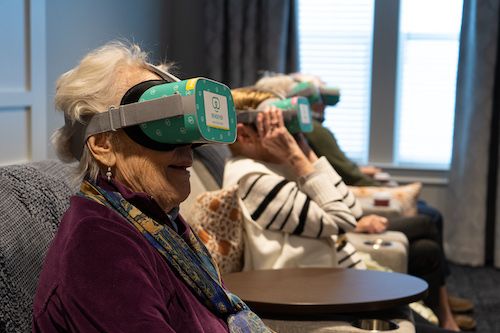Boston-based Rendever will use a $2 million National Institute on Aging grant to study the effects of its virtual reality platform on senior living residents and their families.
The company is working with the University of California, Santa Barbara, to research family engagement and the differences in the effects of virtual reality across various levels of cognitive impairment. The Phase II study will collect data through the end of 2022 from approximately 400 participants in 12 senior living communities across the country, including Vista del Monte, Covenant Living at Samarkand, Atterdag Village of Solvang, AlmaVia in Camarillo and several communities operated by Northbridge Companies in Massachusetts.
The study builds on a previous Small Business Technology Transfer Phase I grant study.
As in the Phase I study, residents will participate in weekly virtual reality experiences with an adult child who lives at a distance. The experiences will include travel adventures and reminiscence therapy activities. The activities will enable the residents and their family members, who will both wear headsets, to share experiences together, in real time, that would otherwise not be possible given distance and health limitations.
“The VR technology includes voice communication that allows participants to talk about the experience as it’s happening, and staff are trained to promote conversation and dialogue through each session,” said Nancy Collins, Ph.D., a UC Santa Barbara social psychology professor, adding that the experience is thought to lead to increased feelings of trust and social engagement, as well as a reduction in depression. “With this study, we are pushing the boundaries and allowing families to participate in and help curate the networked experience for their loved ones,” she said.
The company said the platform provides an opportunity for shared experiences that are “more emotionally and psychologically rich than typical modes of communication,” including weekly phone calls or video chats.
The Phase I study revealed that the highest level of both conversational engagement and physical engagement came from residents as they were experiencing their life stories, such as visiting their childhood home and reliving moments with a family member in a virtual “family room.”
“We have always believed that individualized programming is the best way to engage with residents of all cognitive levels, and allowing families to customize the experience to each resident can create an incredible opportunity for all parties involved,” Collins said. The pilot study findings support the role and effects of reminiscence therapy in designing immersive experiences, she added.
The Phase II clinical trial will compare the virtual reality experience with video chat sessions to assess quality of life and psychological well-being in all participants. Communication will be assessed through coding of conversational transcripts, as well as via surveys and interviews conducted before and during the intervention period. Follow-up surveys will be conducted at one month and three months to assess sustained effect on individual and family outcomes.
Researchers also will collect data on user experience and compare outcomes for older adults who have mild cognitive impairment with those who have mild to moderate Alzheimer’s disease or related dementias. The company said that preliminary evidence from the pilot study revealed that the group with greater cognitive impairment experienced even more favorable outcomes than those with mild cognitive impairment.
“This larger study will be important for determining if, and how, responses to virtual reality differ depending on the older adult’s level of cognitive impairment,” Collins said. “It will also provide Rendever with valuable insights into how the technology can be customized to be highly effective for older adults with a range of cognitive functioning — and their family members.”
Calling the clinical trial a “first of its kind,” Rendever co-founder and CEO Kyle Rand said that the technology will help communities “thrive beyond the four walls of the physical building.”
“The future of the industry will be enabled through technology that not only builds thriving communities but also maintains the important social connections that exist before a resident moves in,” Rand said.



